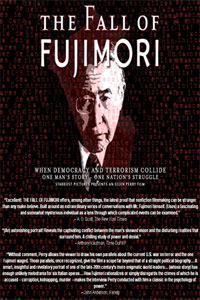The Fall of Fujimori (NR)

synopsis
In a nation besieged by bloody insurgents and appalling poverty appears a humble candidate who vows to fight for the poor and disenfranchised. This political unknown storms into the elections and wins the Presidency. After being sworn in, the new President declares an all out War on Terror, which soon culminates in the capture of public enemy number one. The country is Peru. The President is Alberto Fujimori. The year is 1992. Since fleeing Peru in disgrace, Alberto Fujimori has remained virtually silent about the sensational end of his controversial presidency. Until now. Last January, Fujimori agreed to the first in-depth interview since exile. At the center of Fujimori's presidency are his controversial tactics in the war on terror: hooded judges ruling from behind one-way mirrors, secret military tribunals, and the alleged use of torture and death squads. His extreme measures bring success, resulting in the severe disruption of the two deadliest rebel groups, the Shining Path and the MRTA. But these victories come at a severe cost. Rocked by growing corruption scandals, Fujimori flees to Japan and from a Tokyo hotel, faxes in his letter of resignation. In 2003, Interpol places Alberto Fujimori on its Most Wanted List on charges of corruption, kidnapping and murder. Undeterred by the indictments against him, Fujimori enjoys celebrity status in Japan, where he patiently plots his return to Peru -- and a run for the presidency in 2006.
details
Documentary
1 hr. 23 min.
Opened May 5th, 2006

To get the full Quicklook Films experience, uncheck "Enable on this Site" from Adblock Plus
synopsis
In a nation besieged by bloody insurgents and appalling poverty appears a humble candidate who vows to fight for the poor and disenfranchised. This political unknown storms into the elections and wins the Presidency. After being sworn in, the new President declares an all out War on Terror, which soon culminates in the capture of public enemy number one. The country is Peru. The President is Alberto Fujimori. The year is 1992. Since fleeing Peru in disgrace, Alberto Fujimori has remained virtually silent about the sensational end of his controversial presidency. Until now. Last January, Fujimori agreed to the first in-depth interview since exile. At the center of Fujimori's presidency are his controversial tactics in the war on terror: hooded judges ruling from behind one-way mirrors, secret military tribunals, and the alleged use of torture and death squads. His extreme measures bring success, resulting in the severe disruption of the two deadliest rebel groups, the Shining Path and the MRTA. But these victories come at a severe cost. Rocked by growing corruption scandals, Fujimori flees to Japan and from a Tokyo hotel, faxes in his letter of resignation. In 2003, Interpol places Alberto Fujimori on its Most Wanted List on charges of corruption, kidnapping and murder. Undeterred by the indictments against him, Fujimori enjoys celebrity status in Japan, where he patiently plots his return to Peru -- and a run for the presidency in 2006.
details
Documentary
1 hr. 23 min.
Opened May 5th, 2006






